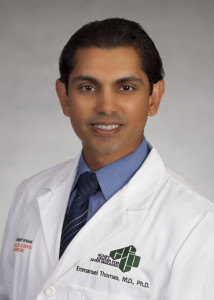 If you are interested in free screening for viral hepatitis, including HCV and HBV, or if you would like to be a part of our clinical trials involving screening for viral hepatitis, please contact Dr. Thomas here. Many of our clinical trials offer compensation for participation.
If you are interested in free screening for viral hepatitis, including HCV and HBV, or if you would like to be a part of our clinical trials involving screening for viral hepatitis, please contact Dr. Thomas here. Many of our clinical trials offer compensation for participation.
Hepatocellular Carcinoma (HCC) is one of the few cancers whose incidence is on the rise and this cancer is predicted to continue to increase in incidence. Published data demonstrate that HCC rates will peak in 2020. Furthermore, effective treatment options for this deadly tumor are limited. The biggest driver of this unfortunate trend is that fact that chronic liver disease resulting from Hepatitis C virus (HCV) infection causes a large percentage of all cases of HCC. There are over 4 million individuals in the United States with chronic infection making HCV the most common chronic blood-borne infection and the aging HCV infected population in the United States is driving the increasing HCC incidence rates. HCV is a particularly difficult pathogen to study in-vitro; however, research focused on this particular virus is yielding tremendous insight into how viruses cause cancer. Dr. Thomas’ program is aimed at limiting the morbidity and mortality of HCC through several broad efforts. The first involves clinical studies aimed at preventing HCC by curing patients of HCV through community screening programs and subsequent linkage to care. Curing infected patients of HCV is one of the most effective ways of preventing the development of HCC. In addition, his group has a clinical protocol to prevent the development of HCC in patients with liver disease through the use of cholesterol lowering Statin medications. Specifically, Statins have been shown to have a chemopreventative effect on the development of HCC in published meta-analyses although the mechanisms behind these observations remain to be elucidated.
Lastly, Dr. Thomas and his group are also characterizing the intrinsic innate immune response hepatocytes mount immediately following infection with HCV in normal and HCC tumor specimens and NL63 human coronavirus. Data gleaned from these studies will be utilized to develop novel antivirals and innovative treatment regimens for HCV infected individuals. In addition, a better understanding of hepatocyte antiviral pathways will lead to the identification of adjuvants that can stimulate hepatocytes to strengthen the efficacy of vaccines targeting HCV. Specific areas of interest of the laboratory program include the function of the type III interferons (IFNs) also known as interferon lambda (λ). IFNs are produced by hepatocytes in response to HCV infection and they are used to treat HCV infection to cure patients of this virus. The IFNs are secreted from the cell, and following interaction with cellular receptors exert potent antiviral and antitumor activity. Overall, these efforts to prevent HCC and understand the mechanism behind the development of HCV induced HCC are the thrust of our work. Since, Dr. Thomas was raised in Miami and obtained his medical training here, his program is committed to reducing the burden of HCC in our South Florida community.
Highlights
- Discovered the hepatitis C virus (HCV) induces type III interferons in primary human hepatocytes and also that this antiviral response is blunted in transformed hepatic cell lines.
- Elucidated a novel mechanism of action of ribavirin in antiviral therapy for HCV.
- Discovered new innate immune recognition pathways important for recognizing RNA virus infection.
Major Interests
- Innate Immune Responses to Hepatitis C Virus and its Role in Development of Hepatocellular Carcinoma.
- Innate Immune Responses to Hepatitis B Virus and its Role in Development of Hepatocellular Carcinoma.
- Clinical Studies Aimed at the Prevention of Hepatocellular Carcinoma.
- Innate Immune Responses of Human Hepatocytes to NL63 Human Coronavirus.
- Comparative Studies of SARS-CoV-2 Virology and COVID-19 Disease Progression.
Selected Cancer-Related Publications
- Thomas E, Ghany MG, Liang TJ: The Application and Mechanism of Action of Ribavirin in Therapy of HCV. Antiviral Chemistry and Chemotherapy. 2012 Sep 25;23(1):1-12. Read more »
- Thomas E, Gonzalez VD, Modi AA, Chen W, Noureddin M, Rotman Y, Liang TJ: Robust Induction of Type III Interferons and other Cytokines Defines a Unique Pattern of Innate Immunity to HCV Infection. Gastroenterology 2012 Apr;142(4):978-88. Read more »
- Thomas E: Genome-Wide Association Studies: “SNPing” Away at Liver Disease. Gastroenterology & Hepatology. June 2011, Vol. 7, Issue 6, Pages: 407-409. Read more »
- Thomas E, Feld JJ, Li Q, Hu Z, Fried MW, Liang, TJ: Ribavirin Potentiates Interferon Action by Augmenting Interferon-Stimulated Gene Induction in HCV Cell Culture Models. Hepatology. 2011 Jan;53(1):32-41 Read more »
- Feld JJ, Modi AA, El-Diwani R, Rotman Y, Thomas E, Koh C, Cherepanov V, Heller T, Ghany MG, Park Y, Hoofnagle JH, Liang TJ: S-adenosyl methionine improves early viral kinetics and interferon stimulated gene induction by the combination of peginterferon and ribavirin in previous hepatitis C genotype 1 non-responders. Gastroenterology. 2011 Mar;140(3):830-9. Read more »
- Thomas E and Fried MW: Hepatitis C: Current Options for Nonresponders to Peginterferon and Ribavirin. Current Gastroenterology Reports. 2008 Feb;10(1):53-9. Read more »
Programs
- Collaborating in the Multidisciplinary Research Program(s):
- Viral Oncology Program
- Cancer Prevention, Control, & Survivorship Program